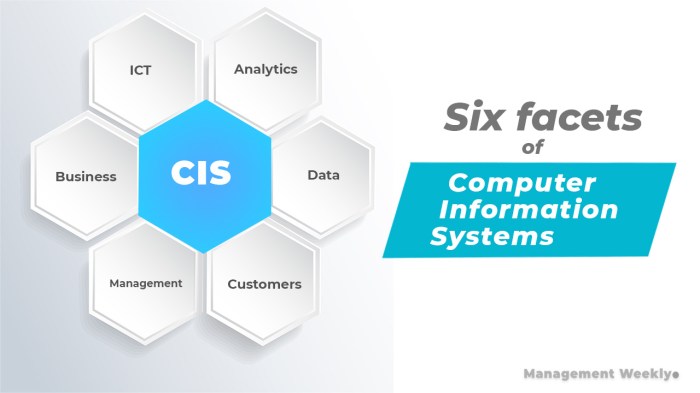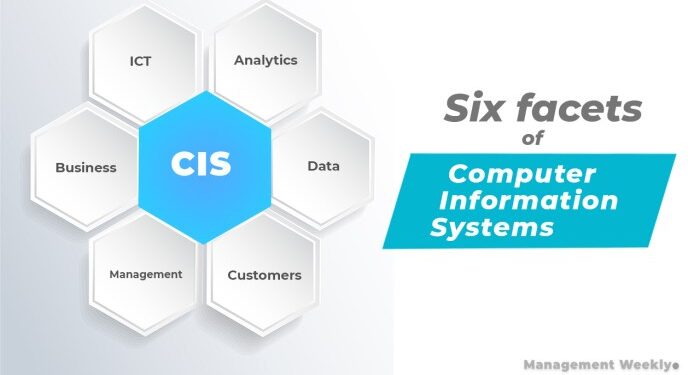Embark on a journey into the realm of computer information systems degree, where the fusion of technology and business acumen creates a dynamic and rewarding career path. Dive into the intricate details of this field with a mix of technical prowess and strategic thinking, shaping the digital landscape of tomorrow.
Unravel the complexities and opportunities that come with pursuing a degree in computer information systems, paving the way for a future filled with innovation and growth.
Overview of Computer Information Systems Degree

A Computer Information Systems degree is a program that focuses on the study of computer technology and its application in a business environment. Students in this program learn how to design, implement, and manage information systems that support organizational goals.
Core Components of a Computer Information Systems Degree
- Programming Languages: Students learn various programming languages such as Java, C++, and Python to develop software applications.
- Database Management: Understanding how to design and manage databases efficiently is a crucial skill in this field.
- Networking: Knowledge of networking concepts and technologies is essential for connecting systems and users.
- Information Security: Learning how to protect data and systems from cyber threats is a critical component of the degree.
Key Skills and Knowledge Areas Covered
- Analytical Skills: Students develop the ability to analyze complex problems and come up with effective solutions.
- Communication Skills: Effective communication is vital for collaborating with team members and presenting technical information.
- Project Management: Understanding project management principles helps in successfully completing IT projects on time and within budget.
Career Opportunities for Graduates
- Systems Analyst: Analyzing and designing information systems to meet business needs.
- Database Administrator: Managing and securing databases to ensure data integrity.
- Network Administrator: Maintaining and optimizing network infrastructure for efficient communication.
- IT Consultant: Providing expert advice on technology solutions to businesses.
Curriculum Details
When pursuing a Computer Information Systems degree, students can expect a well-rounded curriculum that combines technical skills with business knowledge.
Technical Courses
- Programming Languages: Students will learn languages such as Java, Python, or C++ to develop software applications and systems.
- Database Management: This course covers the design, implementation, and maintenance of databases, including SQL queries and database administration.
- Networking and Security: Focuses on network infrastructure, protocols, cybersecurity, and measures to protect data.
- Web Development: Teaches students how to design and build interactive websites using HTML, CSS, and JavaScript.
Business-related Courses
- Project Management: Provides skills in managing projects, including planning, scheduling, and resource allocation.
- Data Analysis: Covers techniques for analyzing and interpreting data to make informed business decisions.
- Information Systems Management: Focuses on aligning technology with business goals, strategic planning, and IT governance.
Specialized Tracks
Students may have the option to choose specialized tracks or concentrations within the Computer Information Systems degree program. Some common tracks include:
- Cybersecurity: Focuses on protecting computer systems and networks from cyber threats.
- Software Development: Emphasizes programming skills and software engineering principles.
- Business Intelligence: Concentrates on data analysis, data mining, and decision support systems.
Importance of Computer Information Systems
In today's digital world, computer information systems play a crucial role in ensuring the smooth operation and success of businesses, organizations, and even individuals. These systems are responsible for managing, processing, and storing vast amounts of data efficiently and securely.
Enhanced Efficiency and Productivity
Computer information systems streamline processes within organizations, leading to increased efficiency and productivity. By automating tasks and providing real-time data, these systems enable employees to make informed decisions quickly.
Data Security and Protection
With cyber threats on the rise, the importance of computer information systems in ensuring data security cannot be overstated. These systems implement security measures to protect sensitive information from unauthorized access, ensuring privacy and compliance with regulations.
Decision-Making Support
Organizations rely on computer information systems to provide accurate and timely information for decision-making. These systems generate reports, analyze data trends, and offer insights that help executives and managers make strategic choices that drive business growth.
Real-World Applications
- Healthcare: Electronic health records systems rely on computer information systems to store patient data securely and facilitate communication among healthcare providers.
- Finance: Banks and financial institutions use computer information systems for online banking, fraud detection, and risk management.
- Retail: Inventory management systems track product sales, optimize stock levels, and forecast demand based on customer data, all made possible by computer information systems.
Skills Development
During a computer information systems degree, students can expect to develop a wide range of practical skills that are highly valued in the tech industry.
Technical Proficiency
- Ability to analyze and design complex software systems
- Proficiency in programming languages such as Java, C++, Python, and SQL
- Understanding of database management systems and network security
Problem-Solving Skills
- Capability to identify and solve IT-related problems efficiently
- Critical thinking and logical reasoning to troubleshoot issues effectively
- Adaptability to new technologies and changing environments
Project Management Abilities
- Experience in managing IT projects from inception to completion
- Effective communication and collaboration skills with team members
- Capability to meet deadlines and deliver high-quality results
Importance of Hands-On Experience
Hands-on experience, internships, and projects play a crucial role in enhancing these skills by providing real-world application opportunities for students. These practical experiences allow students to apply theoretical knowledge in actual scenarios, improving their problem-solving abilities and technical proficiency.
Application of Skills in Various Industries
The skills developed during a computer information systems degree can be applied across a wide range of industries, including:
- Technology companies for software development and IT consulting
- Healthcare organizations for managing electronic health records systems
- Financial institutions for implementing secure online banking solutions
- Retail companies for developing e-commerce platforms
Closure
In conclusion, the realm of computer information systems degree offers a gateway to a world of endless possibilities, where each skill learned and each challenge overcome propels individuals towards success in the ever-evolving tech industry. Embrace the future, armed with knowledge and expertise in this dynamic field.
Common Queries
What are the job prospects for graduates with a computer information systems degree?
Graduates with a computer information systems degree have a wide range of career opportunities, including roles in IT management, system analysis, cybersecurity, and database administration.
Are there any specific concentrations or tracks students can focus on within a computer information systems degree program?
Yes, students often have the option to specialize in areas like cybersecurity, data analytics, software development, or network administration.
How important is hands-on experience during a computer information systems degree program?
Hands-on experience is crucial as it allows students to apply theoretical knowledge to real-world scenarios, enhancing their skills and making them more marketable to employers.
data-ad-client="ca-pub-1784768207398293" data-ad-slot="7141627725" data-ad-format="auto" data-full-width-responsive="true">Embark on a journey into the realm of computer information systems degree, where the fusion of technology and business acumen creates a dynamic and rewarding career path. Dive into the intricate details of this field with a mix of technical prowess and strategic thinking, shaping the digital landscape of tomorrow.
Unravel the complexities and opportunities that come with pursuing a degree in computer information systems, paving the way for a future filled with innovation and growth.
Overview of Computer Information Systems Degree

A Computer Information Systems degree is a program that focuses on the study of computer technology and its application in a business environment. Students in this program learn how to design, implement, and manage information systems that support organizational goals.
Core Components of a Computer Information Systems Degree
- Programming Languages: Students learn various programming languages such as Java, C++, and Python to develop software applications.
- Database Management: Understanding how to design and manage databases efficiently is a crucial skill in this field.
- Networking: Knowledge of networking concepts and technologies is essential for connecting systems and users.
- Information Security: Learning how to protect data and systems from cyber threats is a critical component of the degree.
Key Skills and Knowledge Areas Covered
- Analytical Skills: Students develop the ability to analyze complex problems and come up with effective solutions.
- Communication Skills: Effective communication is vital for collaborating with team members and presenting technical information.
- Project Management: Understanding project management principles helps in successfully completing IT projects on time and within budget.
Career Opportunities for Graduates
- Systems Analyst: Analyzing and designing information systems to meet business needs.
- Database Administrator: Managing and securing databases to ensure data integrity.
- Network Administrator: Maintaining and optimizing network infrastructure for efficient communication.
- IT Consultant: Providing expert advice on technology solutions to businesses.
Curriculum Details
When pursuing a Computer Information Systems degree, students can expect a well-rounded curriculum that combines technical skills with business knowledge.
Technical Courses
- Programming Languages: Students will learn languages such as Java, Python, or C++ to develop software applications and systems.
- Database Management: This course covers the design, implementation, and maintenance of databases, including SQL queries and database administration.
- Networking and Security: Focuses on network infrastructure, protocols, cybersecurity, and measures to protect data.
- Web Development: Teaches students how to design and build interactive websites using HTML, CSS, and JavaScript.
Business-related Courses
- Project Management: Provides skills in managing projects, including planning, scheduling, and resource allocation.
- Data Analysis: Covers techniques for analyzing and interpreting data to make informed business decisions.
- Information Systems Management: Focuses on aligning technology with business goals, strategic planning, and IT governance.
Specialized Tracks
Students may have the option to choose specialized tracks or concentrations within the Computer Information Systems degree program. Some common tracks include:
- Cybersecurity: Focuses on protecting computer systems and networks from cyber threats.
- Software Development: Emphasizes programming skills and software engineering principles.
- Business Intelligence: Concentrates on data analysis, data mining, and decision support systems.
Importance of Computer Information Systems
In today's digital world, computer information systems play a crucial role in ensuring the smooth operation and success of businesses, organizations, and even individuals. These systems are responsible for managing, processing, and storing vast amounts of data efficiently and securely.
Enhanced Efficiency and Productivity
Computer information systems streamline processes within organizations, leading to increased efficiency and productivity. By automating tasks and providing real-time data, these systems enable employees to make informed decisions quickly.
Data Security and Protection
With cyber threats on the rise, the importance of computer information systems in ensuring data security cannot be overstated. These systems implement security measures to protect sensitive information from unauthorized access, ensuring privacy and compliance with regulations.
Decision-Making Support
Organizations rely on computer information systems to provide accurate and timely information for decision-making. These systems generate reports, analyze data trends, and offer insights that help executives and managers make strategic choices that drive business growth.
Real-World Applications
- Healthcare: Electronic health records systems rely on computer information systems to store patient data securely and facilitate communication among healthcare providers.
- Finance: Banks and financial institutions use computer information systems for online banking, fraud detection, and risk management.
- Retail: Inventory management systems track product sales, optimize stock levels, and forecast demand based on customer data, all made possible by computer information systems.
Skills Development
During a computer information systems degree, students can expect to develop a wide range of practical skills that are highly valued in the tech industry.
Technical Proficiency
- Ability to analyze and design complex software systems
- Proficiency in programming languages such as Java, C++, Python, and SQL
- Understanding of database management systems and network security
Problem-Solving Skills
- Capability to identify and solve IT-related problems efficiently
- Critical thinking and logical reasoning to troubleshoot issues effectively
- Adaptability to new technologies and changing environments
Project Management Abilities
- Experience in managing IT projects from inception to completion
- Effective communication and collaboration skills with team members
- Capability to meet deadlines and deliver high-quality results
Importance of Hands-On Experience
Hands-on experience, internships, and projects play a crucial role in enhancing these skills by providing real-world application opportunities for students. These practical experiences allow students to apply theoretical knowledge in actual scenarios, improving their problem-solving abilities and technical proficiency.
Application of Skills in Various Industries
The skills developed during a computer information systems degree can be applied across a wide range of industries, including:
- Technology companies for software development and IT consulting
- Healthcare organizations for managing electronic health records systems
- Financial institutions for implementing secure online banking solutions
- Retail companies for developing e-commerce platforms
Closure
In conclusion, the realm of computer information systems degree offers a gateway to a world of endless possibilities, where each skill learned and each challenge overcome propels individuals towards success in the ever-evolving tech industry. Embrace the future, armed with knowledge and expertise in this dynamic field.
Common Queries
What are the job prospects for graduates with a computer information systems degree?
Graduates with a computer information systems degree have a wide range of career opportunities, including roles in IT management, system analysis, cybersecurity, and database administration.
Are there any specific concentrations or tracks students can focus on within a computer information systems degree program?
Yes, students often have the option to specialize in areas like cybersecurity, data analytics, software development, or network administration.
How important is hands-on experience during a computer information systems degree program?
Hands-on experience is crucial as it allows students to apply theoretical knowledge to real-world scenarios, enhancing their skills and making them more marketable to employers.
data-ad-client="ca-pub-1784768207398293" data-ad-slot="7141627725" data-ad-format="auto" data-full-width-responsive="true">









